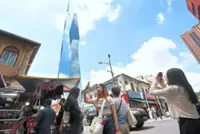KUALA LUMPUR: While the hospitality and tourism industry is seeing a recovery, it continues to face issues, especially staffing.
Industry players want the government to actively work with the sector to address structural issues and offer aid to them.
Already a subscriber? Log in
The Star Festive Promo: Get 35% OFF Digital Access
Cancel anytime. Ad-free. Unlimited access with perks.
Follow us on our official WhatsApp channel for breaking news alerts and key updates!
Thank you for your report!





